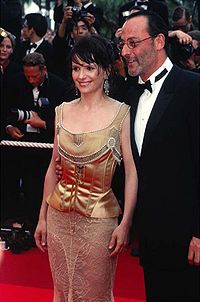Juliette Binoche
| Juliette Binoche | |
|---|---|
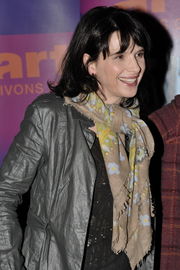 at the Elysee Biarritz movie theatre in Paris on October 22, 2009 |
|
| Born | 9 March 1964 Paris, France |
| Occupation | Actress |
| Years active | 1983–present |
| Partner | André Halle (1991–1993)[1] |
Juliette Binoche (French pronunciation: [ʒyljɛt binɔʃ]; born 9 March 1964) is an award winning French actress, who has appeared in more than 40 films since 1983. She became a leading actress firstly in French cinema with her role in the sucessful André Téchiné directed drama Rendez-vous, then gained international acclaim for her portrayal in The Unbearable Lightness of Being (1988), and won a César Award for Best Actress and the Venice Film Festival for Best Actress for Three Colors: Blue (1993). She won an Academy Award for Best Supporting Actress in The English Patient (1996). Other most notable performances include Les Amants du Pont Neuf (1991), Damage (1992), Chocolat (2000), Caché (2005), The Flight of the Red Balloon (2007) and Certified Copy (2010) for which she received the Best Actress award at the 2010 Cannes Film Festival, making her the first actress in history to win the European 'triple crown'.
Contents |
Early life and career
Binoche was born in Paris, the daughter of Jean-Marie Binoche, a director, actor, and sculptor, and Monique Stalens, a teacher, director, and actress.[2] Binoche's mother is of Polish descent, and her maternal Polish-Catholic grandparents were imprisoned at Auschwitz because they were intellectuals.[3][4] Binoche also has French, Flemish, Brazilian and Moroccan ancestry.[5][6] Her parents divorced when she was four and Binoche and her sister Marion were sent to a boarding school.[7]
Binoche began acting in amateur stage productions, and at 17 directed and starred in a student production of the Eugène Ionesco play, Exit the King. The next year, she studied acting at the National Conservatory of Dramatic Arts of Paris (CNSAD). She found an agent through a friend and joined a theatre troupe in which she toured France, Belgium and Switzerland under the pseudonym of "Juliette Adrienne".
After quitting the CNSAD, she began acting lessons with famed coach Vera Gregh. Following in her mother's footsteps, she became a stage actress, occasionally taking small parts in French feature films.[7] Her first screen role was a small part in the 1983 television film Dorothée, danseuse de corde by Jacques Fensten, which was followed by a similarly small role in the provincial television film Fort bloque by Pierrick Guinnard. After Binoche secured her first big screen appearance with a small supporting role in Pascal Kané's Algeria-themed Liberty Belle, she decided to pursue a career in cinema.
1984–1991
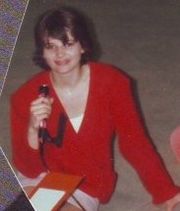
Binoche's early films saw her firmly established as a French star of some renown.[7] The recurring themes of these films were of contemporary young women exploring their lives and their sexuality. Small roles in Les Nanas and Adieu blaireau led to more significant exposure in Jean-Luc Godard's Je vous salue, Marie and Jacques Doillon's La Vie de Famille which cast her as the teenage stepdaughter of Sami Frey's character. This film was to set the theme and tone of the early career.
In 1985, Binoche secured the lead role in André Téchiné's Rendez-vous. The film premiered at the Cannes Film Festival that year, winning Best Director. In 1986, Binoche was nominated for her first César Award for Best Actress for the film. Binoche's next film was a role in Mon beau-frère a tué ma soeur by Jacques Rouffio, which was a critical and commercial failure. Later that year, she starred opposite Michel Piccoli in Léos Carax's Mauvais Sang. This film, however, was a critical and commercial success, leading to Binoche's second César Award nomination. In August 1986, she portrayed Tereza in Philip Kaufman's The Unbearable Lightness of Being based on the Milan Kundera novel. This was Binoche's first English language role and was a worldwide success with critics and audiences alike. After this success, Binoche decided to return to France rather than pursue an international career.
In 1988, she filmed the lead in Pierre Pradinas's Un tour de manège, a little-seen French film. Later that year she began work on Léos Carax's Les Amants du Pont-Neuf. The film was beset by problems and took three years to complete. When it was released in 1991, The Lovers on the Bridge was a critical success. Binoche won a European Film Award for best actress as well as her third César Award nomination.
1992–2000
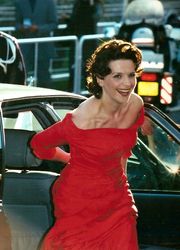
Following the long shoot of Les Amants du Pont-Neuf, Binoche relocated to London for the 1992 productions of Emily Brontë's Wuthering Heights and Damage, both of which considerably enhanced her international reputation. For Damage Binoche received her fourth César Award nomination. In 1993, she appeared in Krzysztof Kieslowski's Three Colors: Blue to much critical acclaim. The film premiered at the 1993 Venice Film Festival, landed Binoche a Prize in Venice, a César Award for Best Actress, and a Golden Globe nomination. After this success, she took a short sabbatical during which she gave birth to her son, Raphael.
In 1995, Binoche appeared in a big-budget adaptation of Jean Giono's The Horseman on the Roof directed by Jean-Paul Rappeneau. The film was a box-office success around the world and Binoche was again nominated for a César Award for Best Actress. This role as a romantic heroine was to color the direction of many of her roles in the late 1990s.
In 1996, Binoche appeared in A Couch in New York by Chantal Akerman. The film was a flop, but her next film was The English Patient, which was based on the acclaimed novel by Michael Ondaatje and directed by Anthony Minghella. The English Patient was a worldwide hit. It received nine Academy Awards, including Best Supporting Actress for Binoche. With this film, she became the second French cinema actress to win an Oscar. She said in her acceptance speech that it was such a surprise, and that she had thought fellow nominee Lauren Bacall was going to win; she started to thank people, but only got past her director Anthony Minghella before laughing that it "must be a dream... a French dream!"[8]
After this international hit, Binoche returned to France and began work opposite Daniel Auteuil on Claude Berri's Lucie Aubrac, which was based on a true story. However, Binoche was released from this film six weeks into the shoot, over differences with Berri regarding the authenticity of his script. Next she worked again with André Téchiné on Alice et Martin (1998), followed in 1999 by Children of the Century in which she played 19th-century French writer George Sand.
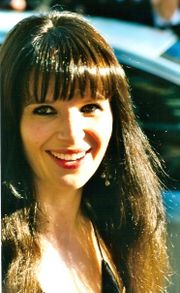
2000 saw Binoche in four successful, but different, roles. Firstly was La Veuve de Saint-Pierre by Patrice Leconte for which she was nominated for a César Award for best actress. Next she appeared in Michael Haneke's Code Unknown, a film which was made following Binoche's approach to the Austrian director. Binoche made her Broadway debut in Harold Pinter's Betrayal for which she was nominated for a Tony Award. Back on screen, Binoche was the heroine of the Lasse Hallstrom film Chocolat for which she won a European Film Award for Best Actress and was nominated for an Academy Award and a BAFTA.
Between 1995 and 2000, Binoche was the advertising face of the Lancôme scent Poème, her image adorning print campaigns and a TV advertising campaign. There were three commercials featuring Binoche for the perfume, including an advert directed by Anthony Minghella and scored by Gabriel Yared.
2001–2006
Following the success of Chocolat, Juliette Binoche returned to France for an unlikely role. Jet Lag (2002) opposite Jean Reno saw Binoche play a ditzy beautician. The film was a box-office hit in France and saw Binoche once again nominated for a César Award for best actress. In 2003, Binoche featured in an Italian TV commercial for the chocolates Ferrero Rocher. This ad played upon her Chocolat persona and featured Binoche handing Rochers to people on the streets of Paris. Next Binoche went to South Africa to film John Boorman's In My Country (2004) opposite Samuel L. Jackson.
Binoche then teamed up with Michael Haneke again for Caché in 2005. The film was an immediate success, winning best director at the 2005 Cannes Film Festival. Binoche was nominated for a European Film Award for Best Actress for her role. Binoche's next film was Bee Season with Richard Gere. Mary (2005) saw Binoche collaborate with Abel Ferrara for an investigation of modern faith and Mary Magdalene's position in the Catholic Church. The film was an immediate success, winning the Grand Prix at the 2005 Venice Film Festival.
2006 saw Binoche take part in the portmanteau work Paris, je t'aime appearing in a section directed by Nobuhiro Suwa. Binoche appeared at the 2006 Venice Film Festival to launch A Few Days in September, by Santiago Amigorena. Later in the month she traveled to the Toronto Film Festival for the premiere of Breaking and Entering, her second film with Anthony Minghella in the director's chair, where she played opposite Jude Law as a Bosnian refugee in London.
2007–present
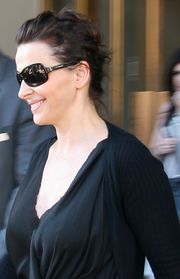
The 2007 Cannes Film Festival saw the premiere of Le Voyage du Ballon Rouge by the Taiwanese director Hou Hsiao-Hsien. The film was well received by international critics and went on to debut around the world in early 2008. In a homage to Albert Lamorisse's 1957 short Le Ballon Rouge, Hou's film tells the story of a single mother's struggles to juggle her responsibilities as a mother with her commitment to her career as a voice artist. The film was number 1 on the influential critic J. Hoberman's Top 10 List for 2008 published in The Village Voice.[9].
Peter Hedges co-wrote and directed her in Dan in Real Life, a romantic comedy opposite Steve Carell. It was released in October 2007, becoming a popular commercial success in the US, before debuting around the world in 2008. To date the film has grossed over $85 million at the worldwide boxoffice.
Back in France Binoche was seen to popular and critical success in Paris by Cédric Klapisch. The ensemble film, a personal ode to the French capital, features an impressive ensemble of French talent including; Romain Duris, Fabrice Luchini and Melanie Laurent. Paris is one of the most successful French films internationally in recent years having grossed $22,850,194 at the world box office.[10]
L'Heure D'été by Olivier Assayas is the critically acclaimed story of three siblings who struggle with the responsibility of disposing of their late mother's valuable art collection following her death. The film premiered in France in March 2008 and debuted at the 2008 New York Film Festival, before going on general release in the US on May 19, 2009. Widely acclaimed the film appeared on numerous Top 10 lists including first place on David Edelstein's Top 10 of 2009 list in New York Magazine, and J.R. Jones's list in the Chicago Reader.[11]
Disengagement by Amos Gitai followed in which Binoche played a French woman of Dutch/Palestinian origins who finds herself on the Gaza Strip searching for a daughter she abandoned 20 years before.
In the Autumn of 2008 Binoche appeared in a theatrical dance production titled in-i with Akram Khan, which featured stage design by Anish Kapoor and music by Philip Sheppard premiering at the National Theatre in London before moving to New York, L.A., Sydney and Paris.[12]. The production was part of a 'Binoche Season' called 'Ju'Bi'lations' which also featured a retrospective of her film work and an exhibition of her paintings, which were published in a bilingual book Portraits in Eyes.[13]
At the 2009 Cannes Film Festival, Binoche revealed that she was developing projects with Hou Hsiao-Hsien, Jia Zhangke and Jiang Wen.[14]
In June 2009 Binoche began work on Certified Copy for Abbas Kiarostami. The film competed for the Palme d'Or at the 2010 Cannes Film Festival.[15] Binoche won the Best Actress Award at the festival for her performance. The film went on general release in France on May 19 2010 to very positive reviews.[16]. Her win at the 2010 Cannes Film festival makes Binoche the first actress in history to win the European 'triple crown': Best Actress at Venice for Trois Couleurs Bleu, Best Actress at Berlin for The English Patient and Best Actress at Cannes for Certified Copy.
In interviews at the 2010 festival, Binoche revealed that she is currently developing film projects with Jia Zhangke and Peter Kosminsky, who directed her in her 1992 film Emily Brontë's Wuthering Heights.
In April 2010, Binoche began shooting Son of No One for American director Dito Montiel. The film also stars Channing Tatum, Al Pacino and Ray Liotta. It is due for release in the US in December 2010.
In June 2010, Binoche started work on Sponsoring for Polish director Malgorzata Szumowska.
She is due to shoot Relative Insanity for Larry Moss later in 2010.
Personal life
Binoche has two children: Raphaël (born on 2 September 1993), whose father is André Halle, a professional scuba diver, and Hana (born on 16 December 1999), whose father is actor Benoît Magimel, with whom Binoche starred in the 1999 film Children of the Century.
She previously had romantic relationships with Leos Carax, Olivier Martinez, a brief relationship with Daniel Day Lewis and a relationship with Argentine writer/director Santiago Amigorena between 2005 and 2008.[1]
Painting
In the 1991 film Les Amants du Pont-Neuf, in which Binoche portrays an artist, the paintings used in the film were Binoche's own work. She also designed the poster for the film.
In 1993, Binoche exhibited work done in collaboration with the French designer and artist Christian Fenouillat. They plan to collaborate again in the future and are currently working on pieces themed by Cinema.[17]
In November 2008, Juliette Binoche published a bilingual large format book entitled "Juliette Binoche, Portraits In-Eyes". The book contains large full page portraits of each director she has worked with to date as well as self portraits of her as each character. Binoche also wrote a few lines dedicated to each director. The book was published by French house "Editions Place des Victoires"
Charities
Binoche has been involved with a number of charities, including being a patron of the Cambodian charity Aspecta since 1992. She is also godmother to five Cambodian orphans.
In 2004, Binoche organised an auction on behalf of Médecins Sans Frontières, in which disposable cameras were given to numerous celebrities and then auctioned off; the winner of each camera would then develop the pictures to reveal that celebrity's chosen subject.
Political views
In 2007, Binoche said she disagreed with the official version of the September 11 attacks, and that US government agencies must have had fore-knowledge of the attacks.[18][19]
She supported José Bové in the 2007 French presidential elections which were won by Nicolas Sarkozy.[20] She has disclosed on a number of occasions that she does not approve of the Sarkozy administration, stating that the president is creating a monarchic republic.[21][22]
At the 2010 Cannes Film Festival Binoche spoke out against the detention of Iranian director Jafar Panahi, incarcerated in Teheran's Evin Prison since March 1st 2010 without charge or conviction. At the press conference following the press screening of Copie Conforme, Binoche was informed that Panahi had begun a hunger strike.[23]
The following day Binoche attended a press conference called especially to demand the release of Panahi. Also in attendance were Abbas Kiarostami, Mohsen Makhmalbaf, Gilles Jacob. Binoche read a letter which pointed out that Panahi's detention was "unwarranted and intolerable".
When Binoche was awarded the Best Actress award at the festival, brandishing his name on a placard, she used her speech as an opportunity to raise Panahi's plight once again.[24] On May 25th it was announced that Panahi had been released on bail. It was generally agreed that the publicity Binoche and Kiarostami elicited for his case was a strong factor in his release.[25]
Filmography and awards
| Year | Film | Role | Notes |
|---|---|---|---|
| 1983 | Dorothée, danseuse de corde | minor role | aka: Dorothy the Rope Dancer Television |
| Liberty belle | La fille du rallye | ||
| 1985 | Le Meilleur de la vie | Une amie de Véronique au bar | aka: A Better Life |
| Rendez-vous | Nina/Anne Larrieux | Nominated – César Award for Best Actress | |
| Adieu blaireau | Brigitte B., dite B.B. | aka: Farewell Blaireau | |
| La Vie de famille | Natacha | aka: Family Life | |
| Les Nanas | Antoinette | aka: The Chicks | |
| 'Je vous salue, Marie' | Juliette | aka: Hail Mary | |
| Fort bloqué | Nicole | Television | |
| 1986 | Mauvais sang | Anna | aka: Bad Blood Nominated – César Award for Best Actress |
| Mon beau-frère a tué ma soeur | Esther Bouloire | aka: My Brother-in-law Has Killed My Sister | |
| 1988 | The Unbearable Lightness of Being | Tereza | |
| 1989 | Un tour de manège | Elsa | aka: Roundabout |
| 1991 | Les Amants du Pont-Neuf | Michèle Stalens | aka: The Lovers on the Bridge Nominated – César Award for Best Actress |
| Women & Men 2: In Love There Are No Rules | Mara | Television | |
| 1992 | Damage | Anna Barton | Nominated – César Award for Best Actress |
| Emily Brontë's Wuthering Heights | Cathy Linton / Catherine Earnshaw | ||
| 1993 | Trois couleurs: Bleu | Julie Vignon (de Courcy) | aka: Three Colors: Blue Won – César Award for Best Actress Won – Venice Film Festival for Best Actress Nominated – Golden Globe |
| 1994 | Trois couleurs: Blanc | Julie Vignon (de Courcy) | aka: Three Colors: White |
| Trois couleurs: Rouge | Julie Vignon (de Courcy) | aka: Three Colors: Red | |
| 1995 | The Horseman on the Roof | Pauline de Théus | Nominated – César Award for Best Actress |
| 1996 | The English Patient | Hana | Academy Award for Best Supporting Actress BAFTA Award for Best Actress in a Supporting Role Chlotrudis Award for Best Supporting Actress Berlin Film Festival for Best Actress Nominated – Golden Globe Award for Best Supporting Actress – Motion Picture |
| A Couch in New York | Beatrice Saulnier | ||
| 1998 | Alice et Martin | Alice | aka: Alice and Martin |
| 1999 | Children of the Century | George Sand/Baroness Aurore Dudevant | |
| 2000 | Chocolat | Vianne Rocher | Nominated – Academy Award for Best Actress Nominated – BAFTA Award for Best Actress in a Leading Role Nominated – Golden Globe Award for Best Actress – Motion Picture Musical or Comedy |
| Code Unknown: Incomplete Tales of Several Journeys | Anne Laurent | ||
| La Veuve de Saint-Pierre | Pauline (Madame La) | aka: The Widow of Saint-Pierre Nominated – César Award for Best Actress |
|
| 2002 | Jet Lag | Rose | Nominated – César Award for Best Actress |
| 2004 | In My Country | Anna Malan | |
| 2005 | Mary | Marie Palesi / Mary Magdalene | |
| Bee Season | Miriam | ||
| Caché | Anne Laurent | aka: Hidden Nominated – European Film Award for Best Actress |
|
| 2006 | Breaking and Entering | Amira | |
| Quelques Jours en Septembre | Irène Montano | aka: A Few Days in September | |
| Paris, je t'aime | Suzanne | aka: Paris, I Love You segment "Place des Victoires" |
|
| 2007 | Dan in Real Life | Marie | |
| Disengagement | Ana | ||
| Le Voyage du Ballon Rouge | Suzanne | aka: Flight of the Red Balloon | |
| 2008 | Paris | Elise | |
| L'Heure d'été | Adrienne | aka: Summer Hours | |
| Shirin | Woman in audience | ||
| 2009 | Certified Copy | Elle | Cannes Film Festival Award for Best Actress (Best Actress Award) |
| 2011 | The Son of No One | TBA | in production |
| Sponsoring | TBA | pre-production | |
| Relative Insanity | Anne | pre-production |
Other awards
Won
- 1986 — Prix Romy Schneider
- 1992 — European Film Award — Best Actress — Les Amants du Pont-Neuf
- 1993 — Berlin International Film Festival — Berlinale Camera
- 1993 — Venice Film Festival — Best Actress — Three Colors: Blue
- 1996 — National Board of Review — Best Supporting Actress — The English Patient
- 1997 — Berlin International Film Festival — Best Actress — The English Patient
- 1997 — European Film Award — Best Actress — The English Patient
- 1997 — Screen Actors Guild Award — Best Supporting Actress — The English Patient
- 2010 — Cannes Film Festival — Best Actress — Certified Copy
Nominations
- 2001 — Screen Actors Guild Award — Best Actress — Chocolat
- 2001 — Academy Award for Best Actress in a Leading Role — Chocolat
- 2001 — Screen Actors Guild Award — Outstanding Cast — Chocolat
- 2005 — European Film Award Best Actress; — Caché
- 2005 — London Critics Circle Film Awards — Best Actress — Caché
- 2006 — British Independent Film Award — Best Actress — Breaking & Entering
References
- ↑ 1.0 1.1 Juliette Binoche Biography at Yahoo! Movies
- ↑ Juliette Binoche Biography (1964–) at Film Reference
- ↑ Groskop, Viv (August 2007). "Juliette Binoche: Femme fatale". The Daily Telegraph. http://www.telegraph.co.uk/arts/main.jhtml?xml=/arts/2007/09/01/sm_juliettebinoche01.xml&page=2.
- ↑ Schaefer, Stephan (March 19, 1997). "Fame isn't fine by Juliette Binoche". USA Today. http://www.petey.com/kk/docs/binousa.txt.
- ↑ Scotsman.com Living
- ↑ DEBRUGE, PETER (December 12, 2006). "Juliette Binoche, 'Breaking and Entering'". Variety (magazine). http://www.variety.com/awardcentral_article/VR1117955600.html?nav=actress07.
- ↑ 7.0 7.1 7.2 Stated in interview at Inside the Actors Studio
- ↑ Juliette Binoche Oscar Acceptance Speech
- ↑ http://www.metacritic.com/film/awards/2008/toptens.shtml
- ↑ http://www.the-numbers.com/movies/2009/PARIS.php
- ↑ http://www.metacritic.com/film/awards/2009/toptens.shtml
- ↑ National Theatre : National Theatre homepage : Homepage
- ↑ http://www.culturesfrance.com/evenement/Juliette-Binoche-In-I-Jubilations-en-tournee-dans-le-monde/evpg732.html
- ↑ "Binoche veut changer le monde". Le Parisien. 15.05.2009. http://www.leparisien.fr/loisirs-et-spectacles/binoche-veut-changer-le%20-monde-15-05-2009-513512.php.
- ↑ "Hollywood Reporter: Cannes Lineup". hollywoodreporter. http://www.hollywoodreporter.com/hr/content_display/world/news/e3i3d82e5b089623802884efcd38a037f67?pn=2. Retrieved 2010-04-15.
- ↑ http://www.allocine.fr/film/fichefilm_gen_cfilm=128902.html
- ↑ Mariinsky Theatre biography for Christian Fenouillat
- ↑ Groskop, Viv (August 31, 2007). "Juliette Binoche: Femme fatale". The Daily Telegraph. http://www.telegraph.co.uk/culture/3667661/Juliette-Binoche-Femme-fatale.html. Retrieved May 28, 2009.
- ↑ Walker, Peter (September 14, 2007). "Binoche falls for 9/11 conspiracy theories". Guardian. http://www.guardian.co.uk/film/filmblog/2007/sep/14/whateverthesometimesvarying. Retrieved May 28, 2009.
- ↑ "Bobo-démago : Binoche aime Bové". Novopress. Rivarol (magazine). April 6, 2007. http://fr.novopress.info/?p=7818.
- ↑ Martínez, Angélica (18/03/2008). "Julitte Binoche: "Sarkozy es un nuevo Napoléon"". http://www.hoycinema.com/actualidad/noticias/Julitte-Binoche-Sarkozy-nuevo-Napoleon.htm.
- ↑ Macdonald, Marianne (06 Jul 2008). "Juliette Binoche: 'I'm finally allowing myself to be me'". The Daily Telegraph. http://www.telegraph.co.uk/culture/film/3555919/Juliette-Binoche-Im-finally-allowing-myself-to-be-me.html.
- ↑ http://observers.france24.com/en/content/20100525-juliette-binoche-appeal-very-influential-panahi-release-iran-kiarostami
- ↑ http://www.salon.com/entertainment/movies/film_salon/2010/05/23/palme_dor_cannes/index.html
- ↑ http://observers.france24.com/en/content/20100525-juliette-binoche-appeal-very-influential-panahi-release-iran-kiarostami
External links
- Juliette Binoche at the Internet Movie Database
- Juliette Binoche at Yahoo! Movies
- Juliette Binoche at Allmovie
- Juliette Binoche at filmsdefrance.com
- Juliette Binoche Interview at AMCtv.com
|
|||||
|
|||||
|
|||||||
|
||||||||||||||||||||
